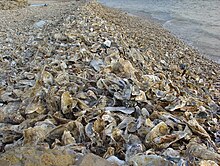ostra: difference between revisions
Jump to navigation
Jump to search
Content deleted Content added
m standardize templatized topical categories for lang=gl using {{C}} |
|||
| (6 intermediate revisions by 4 users not shown) | |||
| Line 1: | Line 1: | ||
{{also| |
{{also|Appendix:Variations of "ostra"}} |
||
==Catalan== |
==Catalan== |
||
{{wikipedia|lang=ca}} |
{{wikipedia|lang=ca}} |
||
| Line 8: | Line 8: | ||
===Pronunciation=== |
===Pronunciation=== |
||
* {{ca-IPA|ò}} |
* {{ca-IPA|ò}} |
||
* {{audio|ca|LL-Q7026 (cat)-Unjoanqualsevol-ostra.wav |
* {{audio|ca|LL-Q7026 (cat)-Unjoanqualsevol-ostra.wav}} |
||
===Noun=== |
===Noun=== |
||
| Line 26: | Line 26: | ||
===Etymology=== |
===Etymology=== |
||
{{inh+|cbk|es|ostra}}. |
|||
===Pronunciation=== |
|||
{{cbk-IPA}} |
|||
* {{hyph|cbk|os|tra}} |
|||
===Noun=== |
===Noun=== |
||
{{ |
{{cbk-noun}} |
||
# [[oyster]] |
# [[oyster]] |
||
| Line 124: | Line 128: | ||
====Derived terms==== |
====Derived terms==== |
||
{{col-auto|es|aburrirse como una ostra|champiñón ostra|ostrería|ostrero|salsa de ostras}} |
|||
{{col-auto|es |
|||
|aburrirse como una ostra |
|||
|champiñón ostra |
|||
|ostrería |
|||
|ostrero |
|||
|salsa de ostras |
|||
}} |
|||
===Further reading=== |
===Further reading=== |
||
* {{R:es:DRAE}} |
* {{R:es:DRAE}} |
||
{{C|es |
{{C|es|Seafood|Bivalves}} |
||
Revision as of 00:45, 8 July 2024
See also: Appendix:Variations of "ostra"
Catalan
Etymology
Borrowed from Portuguese ostra, from Latin ostrea.
Pronunciation
Noun
ostra f (plural ostres)
Derived terms
Further reading
- “ostra” in Diccionari de la llengua catalana, segona edició, Institut d’Estudis Catalans.
Chavacano
Etymology
Pronunciation
Noun
ostra
Galician
Etymology
Attested since the 13th century. From Old Galician-Portuguese [Term?], from Latin ostrea, from Ancient Greek ὄστρεον (óstreon).
Pronunciation
Noun
ostra f (plural ostras)
- oyster
- 1417, A. Rodríguez González (ed.), Libro do Concello de Santiago (1416-1422). Santiago de Compostela: Consello da Cultura Galega, page 75:
- Iten as ostras eschousas a seis dineiros cada libra. Iten das ostras cascudas quatro a o dineiro.
- Item, open oysters, six diñeiros each pound. Item, oysters with shell, four each diñeiro
- Iten as ostras eschousas a seis dineiros cada libra. Iten das ostras cascudas quatro a o dineiro.
- 1417, A. Rodríguez González (ed.), Libro do Concello de Santiago (1416-1422). Santiago de Compostela: Consello da Cultura Galega, page 75:
Derived terms
References
- Ernesto Xosé González Seoane, María Álvarez de la Granja, Ana Isabel Boullón Agrelo (2006–2022) “ostra”, in Dicionario de Dicionarios do galego medieval (in Galician), Santiago de Compostela: Instituto da Lingua Galega
- “ostra” in Xavier Varela Barreiro & Xavier Gómez Guinovart: Corpus Xelmírez - Corpus lingüístico da Galicia medieval. SLI / Grupo TALG / ILG, 2006-2016.
- Antón Luís Santamarina Fernández, editor (2006–2013), “ostra”, in Dicionario de Dicionarios da lingua galega (in Galician), Santiago de Compostela: Instituto da Lingua Galega
- Antón Luís Santamarina Fernández, Ernesto Xosé González Seoane, María Álvarez de la Granja, editors (2003–2018), “ostra”, in Tesouro informatizado da lingua galega (in Galician), Santiago de Compostela: Instituto da Lingua Galega
- Rosario Álvarez Blanco, editor (2014–2024), “ostra”, in Tesouro do léxico patrimonial galego e portugués (in Galician), Santiago de Compostela: Instituto da Lingua Galega, →ISSN
Latin
Noun
ostra
Norwegian Nynorsk
Noun
ostra f (definite singular ostra, indefinite plural ostrer or ostror, definite plural ostrene or ostrone)
Polish
Pronunciation
Adjective
ostra
Portuguese

Etymology
From Latin ostrea, from Ancient Greek ὄστρεον (óstreon).
Pronunciation
- Hyphenation: os‧tra
Noun
ostra f (plural ostras)
- oyster (mollusk)
Hypernyms
Descendants
Spanish
Etymology
Borrowed from Portuguese ostra, inherited from Latin ostrea.
Pronunciation
Noun
ostra f (plural ostras)
Derived terms
Further reading
- “ostra”, in Diccionario de la lengua española (in Spanish), online version 23.7, Royal Spanish Academy, 2023 November 28
Categories:
- Catalan terms borrowed from Portuguese
- Catalan terms derived from Portuguese
- Catalan terms derived from Latin
- Catalan terms with IPA pronunciation
- Catalan terms with audio pronunciation
- Catalan lemmas
- Catalan nouns
- Catalan countable nouns
- Catalan feminine nouns
- ca:Bivalves
- ca:Seafood
- Chavacano terms inherited from Spanish
- Chavacano terms derived from Spanish
- Chavacano terms with IPA pronunciation
- Chavacano lemmas
- Chavacano nouns
- Galician terms inherited from Old Galician-Portuguese
- Galician terms derived from Old Galician-Portuguese
- Galician terms inherited from Latin
- Galician terms derived from Latin
- Galician terms derived from Ancient Greek
- Galician terms with IPA pronunciation
- Galician lemmas
- Galician nouns
- Galician countable nouns
- Galician feminine nouns
- gl:Mollusks
- Latin non-lemma forms
- Latin noun forms
- Norwegian Nynorsk lemmas
- Norwegian Nynorsk nouns
- Norwegian Nynorsk feminine nouns
- Norwegian Nynorsk weak feminine nouns ending in -a
- Polish non-lemma forms
- Polish adjective forms
- Portuguese terms derived from Latin
- Portuguese terms derived from Ancient Greek
- Portuguese 2-syllable words
- Portuguese terms with IPA pronunciation
- Portuguese lemmas
- Portuguese nouns
- Portuguese countable nouns
- Portuguese feminine nouns
- pt:Bivalves
- pt:Seafood
- Spanish terms borrowed from Portuguese
- Spanish terms derived from Portuguese
- Spanish terms derived from Latin
- Spanish 2-syllable words
- Spanish terms with IPA pronunciation
- Spanish terms with audio pronunciation
- Rhymes:Spanish/ostɾa
- Rhymes:Spanish/ostɾa/2 syllables
- Spanish lemmas
- Spanish nouns
- Spanish countable nouns
- Spanish feminine nouns
- es:Seafood
- es:Bivalves
